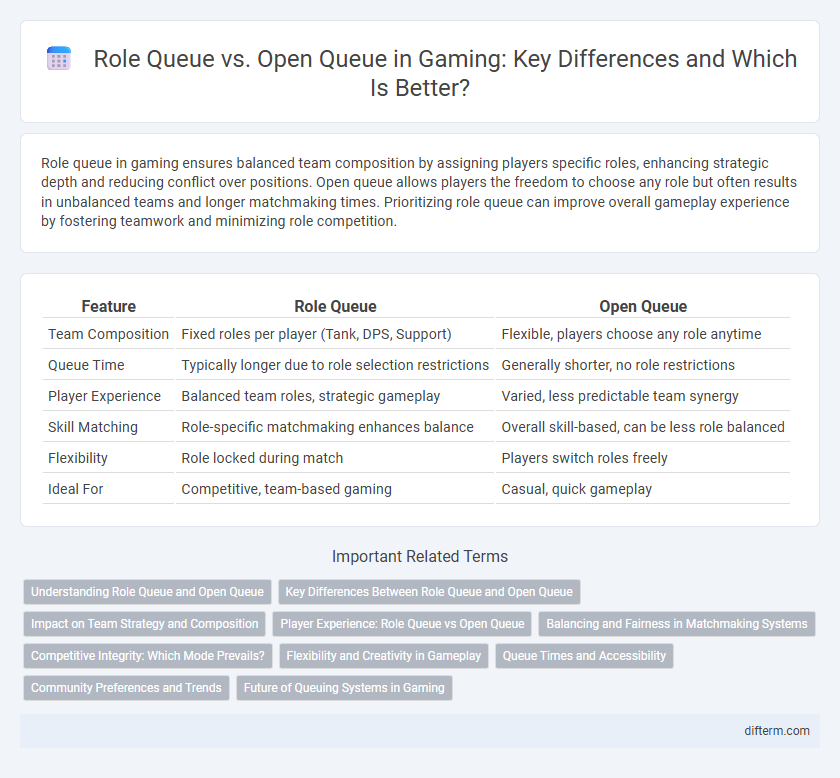Role queue in gaming ensures balanced team composition by assigning players specific roles, enhancing strategic depth and reducing conflict over positions. Open queue allows players the freedom to choose any role but often results in unbalanced teams and longer matchmaking times. Prioritizing role queue can improve overall gameplay experience by fostering teamwork and minimizing role competition.
Table of Comparison
| Feature | Role Queue | Open Queue |
|---|---|---|
| Team Composition | Fixed roles per player (Tank, DPS, Support) | Flexible, players choose any role anytime |
| Queue Time | Typically longer due to role selection restrictions | Generally shorter, no role restrictions |
| Player Experience | Balanced team roles, strategic gameplay | Varied, less predictable team synergy |
| Skill Matching | Role-specific matchmaking enhances balance | Overall skill-based, can be less role balanced |
| Flexibility | Role locked during match | Players switch roles freely |
| Ideal For | Competitive, team-based gaming | Casual, quick gameplay |
Understanding Role Queue and Open Queue
Role Queue assigns players to specific positions within a team, ensuring balanced roles such as tank, damage, and support, which enhances strategic gameplay and teamwork. Open Queue allows players to select any role without restrictions, promoting flexibility but often resulting in less balanced team compositions. Understanding the differences between Role Queue and Open Queue helps players optimize team synergy and improve overall game performance.
Key Differences Between Role Queue and Open Queue
Role queue in gaming requires players to select specific roles before matchmaking, ensuring balanced team compositions and specialized gameplay. Open queue allows players to join matches without role restrictions, offering greater flexibility but often leading to unbalanced team dynamics. Key differences include the predictability of team roles in role queue versus the spontaneous, varied team setups in open queue.
Impact on Team Strategy and Composition
Role queue ensures balanced team composition by assigning players to specific roles, enhancing strategic coordination and synergy. Open queue allows flexibility in player roles, which can lead to unpredictable team dynamics but offers creative strategies through spontaneous role assignments. Choosing role queue typically results in more cohesive gameplay, while open queue demands adaptive team strategies to compensate for potential imbalances.
Player Experience: Role Queue vs Open Queue
Role queue enhances player experience by ensuring balanced team compositions and reducing wait times, leading to more strategic gameplay and less frustration. Open queue offers greater flexibility and spontaneity, appealing to players who enjoy adapting to various roles on the fly. The choice between role queue and open queue significantly impacts teamwork dynamics and overall satisfaction in competitive gaming environments.
Balancing and Fairness in Matchmaking Systems
Role queue prioritizes balanced team compositions by assigning players specific roles, enhancing fairness and reducing mismatched skill levels within teams. Open queue allows players to choose any role, which increases flexibility but often results in unbalanced teams and less equitable matchmaking outcomes. Implementing role queue systems significantly improves competitive integrity by ensuring roles are filled appropriately, leading to more balanced and enjoyable gameplay experiences.
Competitive Integrity: Which Mode Prevails?
Role queue enhances competitive integrity by ensuring balanced team compositions and reducing role conflicts, leading to more strategic gameplay and fairer matchups. Open queue offers flexibility but often results in role imbalances and increased toxicity, undermining coordinated team efforts. Esports organizations and professional players predominantly favor role queue for maintaining consistent competitive standards.
Flexibility and Creativity in Gameplay
Role queue offers structured team compositions that enhance strategic synergy but may limit individual creativity by assigning fixed roles. Open queue promotes flexibility, allowing players to experiment with diverse character combinations and adapt dynamically to in-game situations. The choice influences gameplay style, balancing coordinated teamwork against spontaneous, creative tactics.
Queue Times and Accessibility
Role queue significantly reduces queue times by matching players based on chosen roles, enhancing game accessibility for those who prefer specific positions. Open queue can lead to longer waiting periods due to random role assignments but offers flexibility for players seeking varied gameplay experiences. Balancing queue times and accessibility depends on player preferences and the game's matchmaking infrastructure.
Community Preferences and Trends
Role queue enhances team synergy by allowing players to select specific roles, resulting in more organized gameplay and reduced toxicity. Open queue remains popular for its flexibility and faster matchmaking, appealing to players who prefer spontaneous team compositions. Current trends indicate a growing preference for role queue in competitive gaming communities aiming for balanced and strategic matches.
Future of Queuing Systems in Gaming
Role queue systems enhance team balance and strategic depth by matching players based on predefined roles, leading to more competitive and satisfying gameplay experiences. Open queue systems offer greater flexibility and spontaneity, allowing players to fill any position, which can increase matchmaking speed and accessibility. Future queuing systems will likely integrate adaptive algorithms that combine role preferences and player skill metrics to create dynamic, personalized matchmaking that optimizes both team synergy and player satisfaction.
role queue vs open queue Infographic

 difterm.com
difterm.com